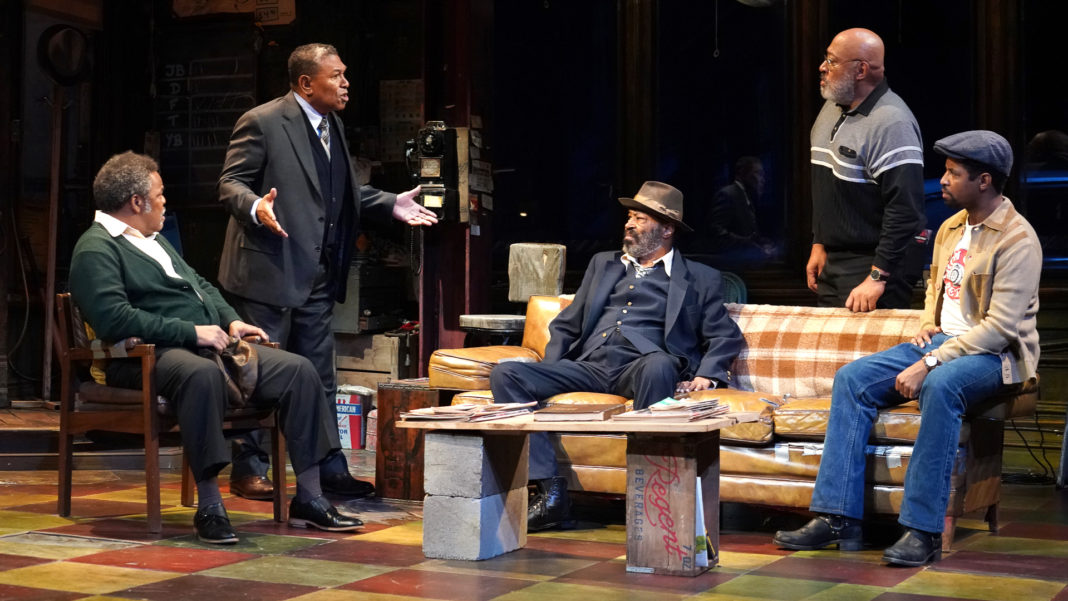In August Wilson’s Jitney, currently playing at the Mark Taper Forum, a small office of cab drivers, or jitneys, are facing the possible end of their business as redevelopment plans in the Pittsburgh suburb where they work may be nearing their start. At the heart of the play, however, is a father-son story that is embodied by actors Steven Anthony Jones as “Becker” and Francois Battiste as “Booster.”
Becker has not seen his son for 20 years as his son was serving time in prison. The timing of Booster’s return couldn’t have been worse and old tensions flare up between the two men.
This is the first of two interviews with these two actors in Jitney. Today we have edited excerpts from my conversation with Jones. He is not just Booster’s father, he also runs the jitney service. To read our interview with Francois Battiste, please go here.
Jones, who spent six years as the Artistic Director of the Lorraine Hansberry Theatre, has appeared on stage for over 46 years. Amongst his credits is the original cast of A Soldier’s Story, Father Comes Home From the Wars (Parts 1, 2 & 3), Fences and he played Wilson in How I Learned What I Learned.
You told the Mercury News earlier this year that you believe Wilson is “the best writer in the American theatre in the 20th century.” You go on to say that in his writing “You say things that pretty much come from ordinary life in a way that is poetic and powerful.” Does the power of Wilson’s work come from his telling of African-American stories or the universality of the stories he tells?
I think when a writer writes with the greatest specificity about something they know and understand, they achieve universality. August Wilson writes with such specificity about African-American life that he achieves universality. I don’t know that writers who achieve universality set out to write universally. I wonder about that. The universality is a result of Wilson’s work.
You’ve performed in five of his plays. How does his language challenge you as an actor?
His language is so poetic that it requires the same stamina as Shakespeare. The long speeches are very elegant and have so much depth in them. It is a workout. It also requires that you grapple with it in a way that allows you to get into it and find all that there is in it in terms of its emotional content and the ideas that he is dealing with. It requires much more work in rehearsal and performance.
What did you learn about Wilson when you took on the part of playing him in his one-man show How I Learned What I Learned?
I was impressed with how playful he is and what a great sense of humor he has. I knew that he was an incredible storyteller and How I Learned… is in large part a series of stories that he tells that have a point or a number of points. His sense of humor is just to me kind of revelatory. It touched something in me that I feel that we shared and it made me wish that I had gotten to know him better.
In Jitney Becker seems to have little tolerance for his son upon Booster’s return. How difficult is it to play a character with no sense of forgiveness?
You know it is funny. I guess that’s how it lands. But I wouldn’t say that Becker has no sense of forgiveness. [He is] deeply wounded by a number of events that I talk about in the play and that are revealed in Scene 4 of Act 1. The end of Act 1 is a conversation that kind of gets out of control. I don’t start in a place that is unforgiving. As Becker I am highly judgmental, so I will completely own that. But at the end of the play when I start to comment to Doub (Keith Randolph Smith) what I have decided is that I will try to talk to my son again.
Note: The next question contains a major spoiler. Please jump to the next question and answer to avoid the reveal.
If Becker had lived long enough to see Booster’s actions at the very end of the play, how do you think he would respond?
[Becker] would have eventually worked it out. It would have taken a long time. Booster seemed to be determined to re-establish a relationship with his father.
The first Broadway production of A Soldier’s Play will go into previews just as Jitney closes in Los Angeles. Why do you think it took so long for a play you premiered in over 25 years ago to make it to Broadway? How will the play resonate with contemporary audiences?
The play has stood the test of time and will continue to stand the test of time because it is a period piece and a murder mystery. It deals with issues of race and color, but those aren’t the driving things within the plot. It will stand the test of time because it is such a good tight drama. I think this production will be successful. It’s a good play and a good cast. Audiences will be as thrilled by it as they were the first time.
Wilson said, “I think all in all, one thing a lot of plays seem to be saying is that we need to, as Black Americans, to make a connection with our past in order to determine the kind of future we’re going to have. In other words, we simply need to know who we are in relation to our historical presence in America.” What connection have you made with your past and how do you define yourself in relation to that historical presence in this country?
As a black man, and I’m older now, so I see my experience, the experience of my father, as marginally shaped by being the descendants of slaves. My parents both came from the South. There are issues of color. My father was dark, my mother was light-skinned. Those issues that existed for them came directly from slavery.
More and more I see my experience, my relationship to the larger society, to institutions within the society, to law enforcement, the criminal justice system, my work as an artist, has largely been shaped by the experience of slavery.
Personally I’m very far removed from that. I guess the over-arching thing for me, now that I’m older and look back on my life, it all kind of comes back to that experience collectively. And then it filters down in many ways for each of us individually. I would say that the biggest thing is that I’m descended from people who were once slaves and that has had an enormous effect on my life.
Photo: Ray Anthony Thomas, Steven Anthony Jones, Anthony Chisholm, Keith Randolph Smith and Amari Cheatom in August Wilson’s Jitney (Photo by Joan Marcus/Courtesy of Center Theatre Group)










